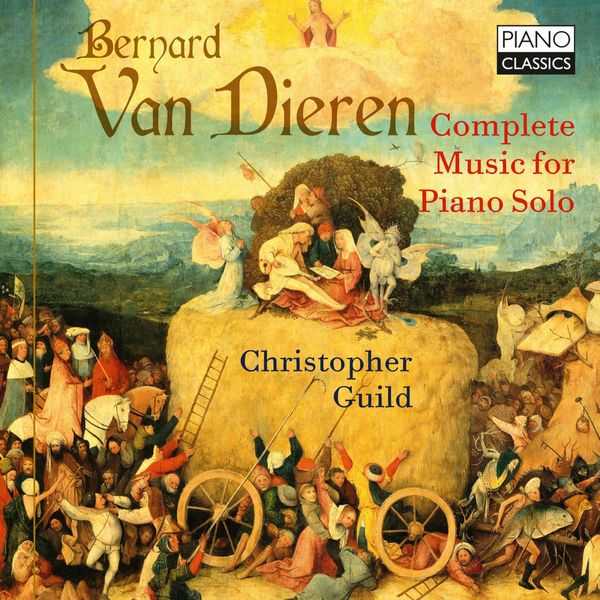

Composer: Bernard van Dieren
Performer: Christopher Guild
Format: FLAC (tracks)
Label: Piano Classics
Catalogue: PCL10241
Release: 2022
Size: 1.51 GB
Recovery: +3%
Scan: yes
6 Sketches, Op. 4a
01. I. Moderato assai
02. II. Quasi andante
03. III. Allegro, rullante. Gracile ma distinto
04. IV. Allegramente
05. V. Poco lento
06. VI. Poco più lento che pezza I.
07. Toccata
Tema con variazione
08. Tema. Sostenuto
09. I.
10. II.
11. III. Molto sostenuto e quasi pesante
12. IV. Risoluto
13. V. Molto più lento
14. VI.
15. VII. Legato
16. VIII. Martellato, assai veloce
17. IX. Molto robusto
18. X. Ugalmente
19. XI. Dolce e distante
20. XII. Presto. Giocoso
21. XIII. Adagio molto
22. XIV. Con ultimo rapidita e brilliantemente
3 Studies
23. I. Assai andante ma con dignità
24. II. Sostenuto, romanticamente
25. III. Presto
Netherlands Melodies
26. I. Andantino
27. II. Semplice ma con solennità
28. III. Sostenuto, con mesto
29. IV. Leggiero, giocoso
30. V. Gaio, fresco (“Ic stont op hoghe berghen”)
31. V(a). Maestoso-chiaro-semplice
32. VI. Poco vivo, dolce (“Daar was laatst een meisje loos”)
33. VII. Andante con moto
34. VIII. Semplice e tenere tempo comodo (“Vroeg op”)
35. IX. Allegro vivace (“Als ik groot ben”)
36. X. Assai secco. Diabelliescamente
37. XI. Alacramente gagliardo (“Des winters als het reghent”)
38. XII. Non troppo lento. Pesante
39. Piccolo pralinudettino fridato
40. Ballad de Villon
The most comprehensive survey ever made on record of the piano output by a highly individual figure on the Dutch and English music scenes of the early 20th century, featuring two world-premiere recordings.
Bernard van Dieren (1887-1936) was born and raised in Rotterdam of a Dutch father and a Dutch-French mother. He moved to London in the autumn of 1909 and married a fellow-Rotterdamer, Frida Kindler, a superb pianist, a favourite pupil of Busoni, and the Italian master had a profound influence on them both. In 1911 van Dieren was present at the Liszt Centenary Concerts that Busoni gave in Berlin. In Busoni’s Berlin apartment he heard a private performance of Schoenberg’s Pierrot lunaire conducted by the composer, which made a deep impression on him, and inspired some of his early works. The influence of Busoni and Schoenberg was strong on the young composer, however he developed his own uniquely personal style, harmonically chromatic, rhythmically fluid and freely polyphonic, tonally anarchic rather than atonal and often notated without bar lines. At the same time melody, particularly the importance of the singing line, is central in his works.
Nevertheless Bernard Van Dieren (1887-1936) was essentially self-taught as a composer, though friendships with Schoenberg, Busoni, Sorabji, Walton and Lambert all obliquely indicate by association both the technical confidence of his work as well as the variegated colours of his harmonic palette. He was born in Rotterdam but fell in love with and then married a pupil of Busoni’s, Frida Kindler, who gave the first performances of most of his piano music.
Kindler and Van Dieren settled in London, where they joined a distinguished artistic circle including the sculptor Jacob Epstein and the Sitwell family. Van Dieren’s devotion to Mediterranean culture and his witty questioning of accepted judgments appealed greatly to the group. He was, for example, one of the first to encourage a re-assessment of the work of Donizetti, Alkan and Meyerbeer.
While earlier works such as the powerful Toccata approach Schoenbergian atonality in their tightly woven chromaticism, Van Dieren’s world is at root a diatonic one, stretching rather than breaking tonalities with a post-Wagnerian sensibility often comparable to the music of Delius. The composer himself was apparently a pianist of modest ability, but (perhaps not least thanks to Frida Kindler) he writes for the instrument with a formidable array of pianistic technique grounded in his own enduring love of counterpoint.
The most straightforwardly appealing music here is a set of 12 Dutch Folk Melodies, followed by a charming little prelude written for Frida’s birthday in 1934 – his last piano work before his death from a long-standing kidney complaint two years later.
The pianist Christopher Guild, renowned for his advocacy of lesser-known pianistic voices, is then joined by Dr. James Reid-Baxter for the first-ever recording of the Ballade de Villon, in which Van Dieren originally set a prayer to the Virgin for reciter and string quartet, with the instrumental lines later transcribed for the piano by Philip Heseltine (a pupil of the composer, himself better known as Peter Warlock). The present album features also a set of six densely polyphonic Sketches in the style of Busoni and a Theme and Variations in the grand Romantic manner.
This release set presents Van Dieren’s complete works for solo piano.